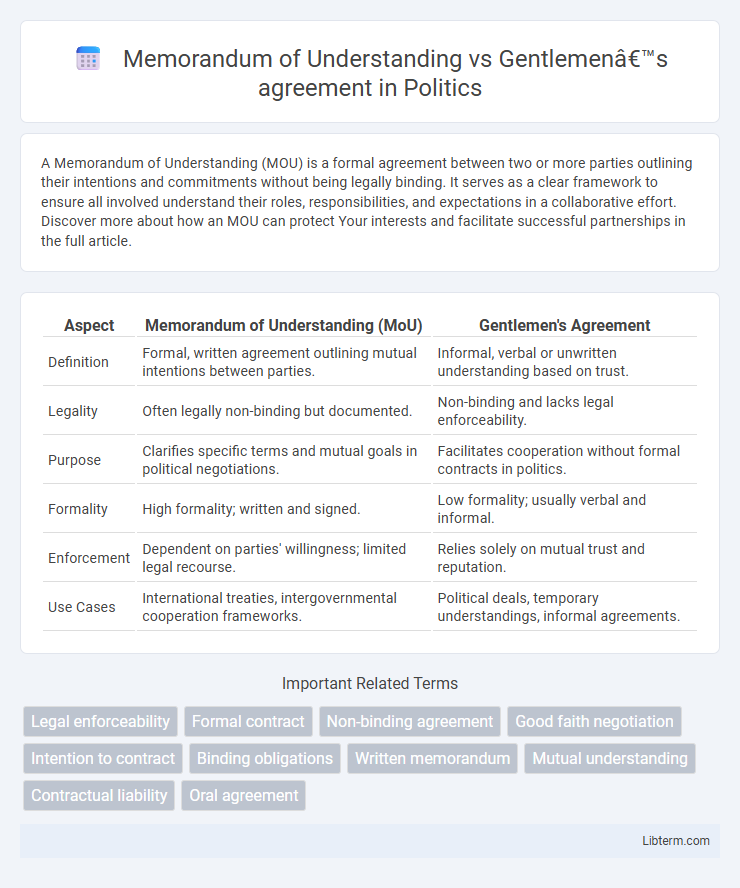A Memorandum of Understanding (MOU) is a formal agreement between two or more parties outlining their intentions and commitments without being legally binding. It serves as a clear framework to ensure all involved understand their roles, responsibilities, and expectations in a collaborative effort. Discover more about how an MOU can protect Your interests and facilitate successful partnerships in the full article.
Table of Comparison
| Aspect | Memorandum of Understanding (MoU) | Gentlemen's Agreement |
|---|---|---|
| Definition | Formal, written agreement outlining mutual intentions between parties. | Informal, verbal or unwritten understanding based on trust. |
| Legality | Often legally non-binding but documented. | Non-binding and lacks legal enforceability. |
| Purpose | Clarifies specific terms and mutual goals in political negotiations. | Facilitates cooperation without formal contracts in politics. |
| Formality | High formality; written and signed. | Low formality; usually verbal and informal. |
| Enforcement | Dependent on parties' willingness; limited legal recourse. | Relies solely on mutual trust and reputation. |
| Use Cases | International treaties, intergovernmental cooperation frameworks. | Political deals, temporary understandings, informal agreements. |
Definition of Memorandum of Understanding (MoU)
A Memorandum of Understanding (MoU) is a formal, written agreement between two or more parties outlining their intentions and commitments without creating legally binding obligations. It serves as a clear record of mutual understanding, often used to define roles, responsibilities, and expectations in collaborative projects or partnerships. Unlike a Gentlemen's Agreement, which relies on trust and informal promises, an MoU provides documented terms that can help prevent misunderstandings and disputes.
Understanding Gentlemen’s Agreement
Gentlemen's Agreement is an informal and non-binding pact based on trust and honor between parties, lacking legal enforceability or written documentation. It differs from a Memorandum of Understanding, which is a formal document outlining roles and expectations but still not legally binding. Gentlemen's Agreements rely heavily on reputation and mutual respect, often used in business or diplomacy where formal contracts are impractical.
Legal Status: MoU vs Gentlemen’s Agreement
A Memorandum of Understanding (MoU) typically holds a semi-formal legal status, outlining agreed intentions between parties but often lacking enforceability unless specified. In contrast, a Gentlemen's Agreement is an informal, non-legally binding arrangement based purely on trust and honor without written documentation. Legal enforcement of MoUs can depend on jurisdiction and content clarity, whereas Gentlemen's Agreements rely entirely on mutual goodwill without judicial recourse.
Key Features and Elements
A Memorandum of Understanding (MoU) is a formal, written agreement outlining specific terms and responsibilities between parties, often legally binding or intended to be so, featuring clear objectives, scope, and signatures for validation. In contrast, a Gentlemen's Agreement is an informal, non-legally binding understanding based on trust and honor, lacking detailed documentation or enforceability but emphasizing mutual goodwill and ethical commitment. Key elements of an MoU include detailed clauses, objectives, and signatures, whereas a Gentlemen's Agreement relies solely on verbal commitments and mutual respect without formal documentation.
Binding Nature and Enforceability
A Memorandum of Understanding (MOU) is generally considered a semi-formal document that outlines the terms and intentions of parties, often carrying some degree of binding obligation depending on its wording and jurisdiction. In contrast, a Gentlemen's Agreement is an informal, non-legally binding understanding based on trust and honor without enforceability in court. The binding nature and enforceability of an MOU depend on explicit language regarding obligations, while Gentlemen's Agreements rely solely on mutual goodwill and lack legal recourse if breached.
Purpose and Usage in Business
A Memorandum of Understanding (MOU) serves as a formal, written agreement outlining the roles, responsibilities, and intentions of involved parties in a business collaboration, providing a clear framework for future contracts. In contrast, a Gentlemen's Agreement relies on informal, unwritten understandings based on mutual trust without legal enforceability, often used in preliminary negotiations or when confidentiality is paramount. Businesses utilize MOUs to establish explicit commitments and minimize risks, while Gentlemen's Agreements facilitate flexible, trust-based arrangements where formal documentation may be impractical.
Documentation and Formality Requirements
A Memorandum of Understanding (MOU) is a formal written document outlining clear terms, responsibilities, and objectives between parties, often legally non-binding but recognized as a serious commitment. Gentlemen's agreements rely on trust and verbal understanding, lacking formal documentation or enforceability, making them informal and dependent on the integrity of the parties involved. MOUs require detailed drafting and signatures, enhancing clarity and reducing disputes, whereas gentlemen's agreements prioritize flexibility and simplicity without written records.
Risks and Limitations of Each Agreement
Memorandum of Understanding (MoU) carries legal weight but may lack enforceability in court due to vague terms, leading to disputes and financial risks. Gentlemen's agreements rely entirely on trust without legal binding, increasing the risk of non-compliance and potential business losses if one party breaks the informal promise. Both agreements face limitations in safeguarding interests, making thorough documentation and clear terms essential to mitigate misunderstandings and operational risks.
When to Use MoU or Gentlemen’s Agreement
Choose a Memorandum of Understanding (MoU) when formalizing clear, written commitments between parties seeking legal recognition and detailed terms. Opt for a Gentlemen's Agreement in informal settings where trust and mutual understanding prevail without the need for legally binding clauses or official documentation. MoUs are suitable for business partnerships, joint ventures, and government collaborations, while Gentlemen's Agreements fit situations requiring flexibility and goodwill without legal enforcement.
Conclusion: Choosing the Right Agreement
Choosing between a Memorandum of Understanding (MOU) and a Gentlemen's Agreement depends on the level of formality and legal enforceability desired. An MOU offers a clear, written framework outlining roles and responsibilities, providing more legal clarity and accountability. Gentlemen's Agreements rely on trust and informal commitments, suitable for partnerships based on mutual respect without requiring legal binding.
Memorandum of Understanding Infographic

 libterm.com
libterm.com